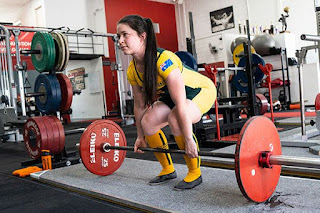Is it possible to become an Experienced Archer in just 10 Weeks?
Well, yes, but it depends upon how you define "Experienced".
Experienced doesn't necessarily mean that are good at something. You can be experienced at rowing a canoe, but that doesn't mean you are very good at it.
Using that definition a toddler could be "experienced at archery", but that doesn't mean they're good at it. [Photo on the right is my son Arthur, who is 11 months old in this picture. It is going to be many years before he is an "experienced archer". My older son Richard (currently 5) meanwhile can shoot moving bubbles in the backyard while barely trying.]
But for the purpose of exploring hypotheticals, how do you go from just starting archery as a complete beginner to becoming an experienced archer in just 10 weeks?
Well, it is certainly possible to do it with a lot of practice, but I believe it is easiest when you have an archery instructor. Becoming "good" at archery is many times slower if a person is trying to do it by being self-taught, but you speed the process up significantly by having an instructor who can help you avoid common mistakes that many beginners get stuck on and they don't know what they're doing wrong.
A good book on the subject can also help, but a book cannot spot your errors when you make them and if you don't know what errors you are making then it cannot teach you how to avoid those bad habits while reinforcing good habits.
One of the biggest factors, in my opinion, is how serious the student is about learning archery. A child who is more interested in staring at their phone isn't going to get as much out of 10 archery lessons than a similar child who pays attention and is excited/enthusiastic about learning archery. Same goes with an adult who is similarly addicted to their phone versus an adult who really wants to learn archery. This isn't so much an age issue as it is a maturity issue.
Speaking on behalf of myself and my archery lessons you can learn quite a bit in 10 lessons, however just because I offer 10 lessons doesn't necesssarily mean that you cannot learn more. I have had some students who keep coming back for more lessons. 20? 50? More than that?
It happens. One of my students (Adam) just keeps coming back for more lessons every year. He was a teenager when he started, now he's in his 20s.
Some archers just want to be challenged constantly and they yearn to learn more things as they progress, possibly learning other styles of archery, other techniques, and more obscure topics that aren't covered in my normal block of 10 lessons.
See my Archery Lesson Plan + How many lessons should you do? post on the subject to learn more about the types of things you can learn during 10 weeks of archery lessons.

























